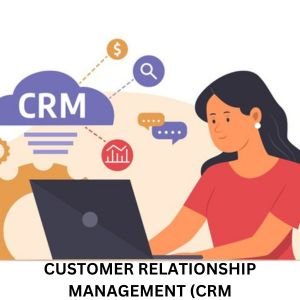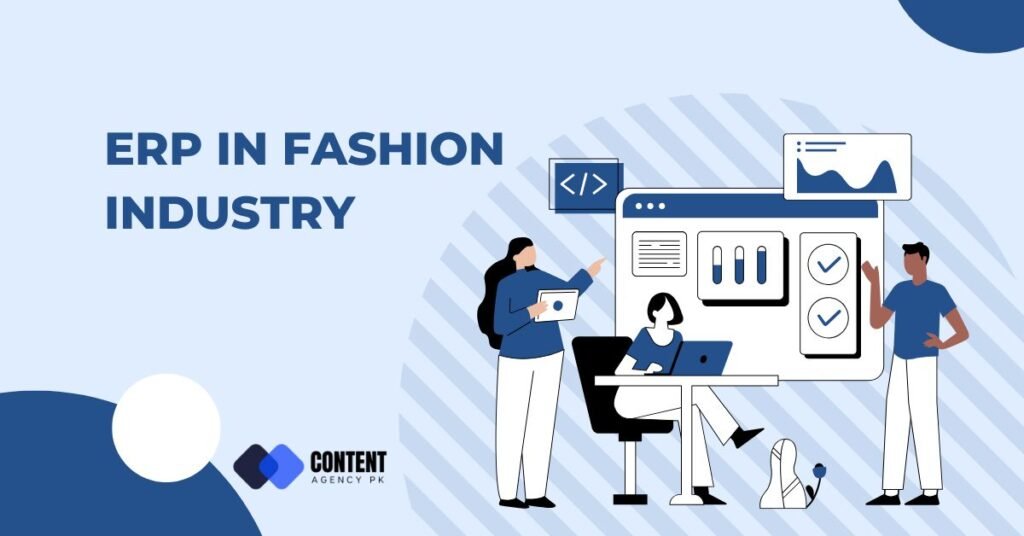Change thy name of fashion industry and in this technology driven and technology sponsored world of transition, it is quite a challenge to keep pace with time, trends, behaviors and market transformation. Moreover, the fashion industry faces transition from within and from outside as it has to integrate changes in the trends introduced by fashion trendsetters and caters to the consumers purchasing behavior, priorities and preferences.
Apart from these factors, change of season changes the customers’ priorities. In this situation, traditional retailing methods have no capacity to step with the fast-moving market trends and customers requirement. It requires a sustainable, integrated and smart system that may encompass all the retailing requirements from manufacturing, consistency in supply chain, quality and prompt delivery.
All these factors necessitate a smart, vibrant, dynamic and efficient system that is called Enterprise Resource Planning (ERP) software.
WHAT IS ERP?
Enterprise Resource Planning (ERP) is a wide-ranging, multipurpose and multidimensional software that provides a complete picture and view of the organization working at different tiers and sections. It provides an effective problem-shooting methods on ground planning and efficient working conditions for the future.
It also provides real time information encompassing all the sections of the business. It offers a complete working environment among the people and technologies to avoid any miscommunication and points out inefficiencies if any.
- ERP AND SOCIAL MEDIA

The shopping of fashion products has gone aloof the traditional methods as it has not restricted to bricks and window outlets. It has gone global breaking the barriers of boundaries, time and traditions. The social media has given new dimensions to the fashion retail sector and the brands have to come up with ideas, platforms and social media outlets to keep pace with the ever-changing time and ever transforming market trends.
In past, the consumers opened the doors to come close to fashion products, now the people click to open the vista of fashion merchandizers. Now the consumers can interact with fashion retailers anywhere and anytime with physical stores, through mobile apps, QR codes and social media. The retailers have to develop smart systems like ERP to design, manage, sell, interact and communicate with the consumers.
WHICH ARE KEY SECTORS OF ERP?
The Enterprise Resource Planning (ERP) is an umbrella term which encompasses many other important sub sectors which may be discussed as;
- INVENTORY MANAGEMENT

Inventory management in ERP is the basic to keep the ball of fashion business rolling as any loophole in supply and demand chain can inflict irreparable loss to the enterprise. A robust, trouble-free and efficient inventory management ensures profitability, business viability and the satisfaction of the customers.
An intelligent and efficient inventory management helps in planning to put right items, at right place and on right time keeping in view the consumers’ choice and preference with deep analysis of seasonal variations, consumers response and with precision in approach. It also helps in making a plan to keep up the stock as per requirement and there should be no excess stock to avoid left-outs.
The ERP system enables the fashion retailers to have real time visibility throughout the supply chain, optimize key tasks through automation and decide and plan as per analysis based on available data. It also helps the enterprises to manage the inventory keeping in view the demand and trends of the consumers in particular and market in general.
- STREAMLINED PRODUCTION

The whole chain of the fashion industry from manufacturing to retailing starts with the production of the fashion items. The cycle of ERP is also associated with the very root of the sprawling fashion industry i.e. the seamless production system.
This key ERP sector is the lifecycle of the fashion industry as it makes the whole of the business model from design to delivery as it includes conceiving idea of design, making its prototype, selecting material, making a perfect production, ensuring distribution and retailing.
In this way, streamlined production is the backbone of the fashion industry and it should be efficient, prompt, responsive, innovative, robust, seamless and trouble-free so that the fashion business may sustain and move forward. The ERP is more relevant is the production stage to have complete update and real time information of all the stages to maintain the stock and cater for the potential consumers.
The ERP helps in ensuring better efficiency, prudent resource allocation, updated visibility of the fashion items, efficient collaboration and communication, precise demand forecasting, quality assurance and compliance, sustained betterment and others.
- CUSTOMER RELATIONSHIP MANAGEMENT (CRM)

Customer Relationship Management (CRM) is an important sector of the ERM and a dynamic and doable marketing strategy as it allows the fashion retailers to have direct interaction with the customers. The CRM compiles and analyzes the customer data and provides a platform for the fashion businesses to interact with the customers through different tools such as SMS, email, website, social media, telephone, live chat and others.
It also provides an opportunity to the fashion retailers to upload promotional material on the social media platforms to ensure their presence on these marketing vistas and disseminate their brand message to the customers. It also helps in analyze customers’ buying behavior, trends and priorities and is a viable method to ensure customers loyalty and retention. The CRM also gets customers feedback and addresses their concerns. It aims at once customer is always a customer.
- ENHANCED REPORTING

Advanced ERP tools enable the fashion businesses to have real time data, deep insight, wider visibility and key performance index (KPI) based analysis of the different tiers and sectors of the business chain. This analytical data provides an impetus to have better decision-making, operational efficiency, lower costs, ensured profit-making and minimized risk factors.
The ERP enhanced reporting also provides integration with multiple data sources, visual and interactive interface, data management, automated and customized reporting, system support based on various formats of documentation, workable dashboard, viable data analysis, mobile compatibility, user friendly and proper data dissemination.
- SUPPLY CHAIN MANAGEMENT

Supply chain management is very crucial component which ensures sustainability, viability and smooth functionality of fashion businesses. Without robust and strong chain of supply chain management, a fashion business becomes prone to various risks.
The ERP provides the fashion businesses an enabling framework which ensures dynamic coordination and streamlining of the complex supply chain that brings raw material into finished products and ensures delivery to the end users. The ERP system also helps the enterprises to integrate supply chain management capabilities such as demand planning, procurement, manufacturing and distribution.
The most important factor of ERP in supply chain management that provides firm control on the costs as lower the cost is, higher the profit is. The efficient supply chain management with valuable raw material procurement, cost-effective manufacturing and efficient distribution can fulfil the customers demand and all this can be possible through the best ERP system.
- QUALITY ASSURANCE

Quality assurance is the fundamental for the sustainability of the fashion businesses as it ensures customers’ loyalty, market visibility and presence and reliability. The quality assurance mechanism backed by ERP helps in detect loopholes, defects and flaws in different sections and subsections from raw material procurement to the manufacturing stage.
This mechanism helps in maintaining uniformity in the finished products, value and premium quality making the products safe for delivery. The ERP software also provides a complete and integrated system to manage end-to-end operations, inspections, audits, lab testing and sampling.
The ERP quality assurance ensures that sustainable clothing manufacturing is safe for environment, reasonable in social perspective and doable in respect of profit. This system also makes it possible that the products are durable, long-lasting and manufactured with minimum waste keeping in view environmental concerns and ethical priorities.
- SCALABILITY

Fashion industry is challenging in a way that it has to face constant changes with respect to growth, trends, season, consumers’ buying priorities, market push and competitiveness. In this scenario, scalability backed by efficient ERP system becomes essential for the very existence of the business.
The scalability ensures firsthand knowledge and analysis of all the sections and subsections of the supply chain from raw material to finished goods. The ERP sponsored system gives a complete picture about plans yet to be implemented, ideas yet to be materialized, perceptions yet to be analyzed and in-hand stock, shelves position, supply chain sustainability, market perceptions, changes coming in the way, seasonal variations, customers behavior and competitive market priorities.
The scalability is also the name of adaptability as ERP scalability provides a clear scenario of the business viability based on the changes and transformation and the enables the fashion industry to adjust itself according to the changes and the coming trends. This is to make a poised flexibility to adapt itself to the emerging scenarios and makes the fashion concerns to stay in the arena of the business.
- APPAREL CONNECT

Apparel connect ERP is a complete apparel manufacturing process from design to shipping making a success story for the fashion manufacturers. It makes it possible for the fashion industrial concerns to maximize the sourcing, procuring and logistics functions.
- PRODUCTION MANAGEMENT

The ERP software presents an enabling dashboard with a complete picture of different sections, tiers and departments of the production process such as procurement, manufacturing, production, inventory management, supply chain management, shelve stocking, rough cut capacity planning, pegging, warehouse management etc.
The ERP system helps in optimizing production schedule and workflows, demand management, financial management and distribution through different channels.
- CONCLUSION

The transient and transformative nature of the fashion industry shows that the survival is only deemed to the fittest and the fittest are those fashion industrial concerns which show prompt and utmost adaptability to the coming changes, flexibility to get them fit in the emerging scenarios and poised themselves as per demands, trends and priorities.
All these factors require an efficient, trouble-free, robust, responsive and prompt system that helps in making quick and right decisions and changes and setting priorities from procurement of the raw material to the finished product ready to go in the hands of the consumers. Apart from these aspects, the system should ensure cost-effectiveness and profitability.
The Enterprise Resource Planning (ERP) covers all these sectors efficiently however, the systems are made to help the human beings not to replace them.
FAQs
Q: How much is ERP beneficial for fashion industry?
Ans. ERP is an efficient software that provides a complete picture of all the functions on the dashboard in the fashion industry and is beneficial in making the processes smooth and trouble-free.
Q: Has ERP replaced the human intervention in fashion industry?
Ans. ERP can guide through analysis of the date but cannot make decisions as decision making is done only by the human beings.
Q: Is ERP the final option for the smooth functioning of fashion industry?
Ans. Though ERP is very helpful in the smooth functioning of the fashion industry but the chances of improvements are always there.

